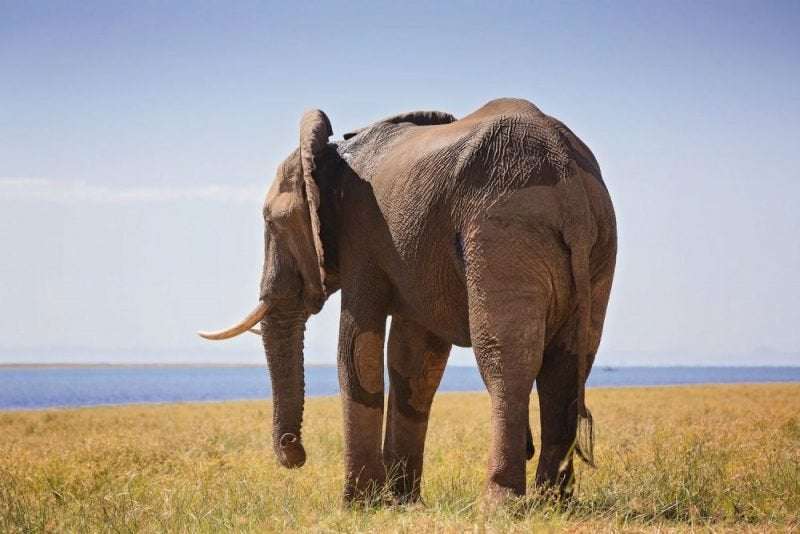Ben’s tracking collar was removed before the reversal drug was given and as with the first procedure he was up on his feet within 5 minutes before marching off across the floodplain to join a nearby herd.
Now many months later, Ben has made a full recovery and appears to be a happy and healthy bull. Whether Ben appeared at the staff houses looking for help or whether it was purely coincidental we will never know.
We are truly humbled by this brave elephant and the support received through our dedicated campaign #helpben which raised $5,000 towards the costs of his treatment. Without support from both the neighboring community and our network of online followers, we may have been dealing with a very different outcome today!
From data collected in aerial surveys carried out over Zimbabwe in 2001 and again in 2013 there has been an estimated decrease in elephant numbers of 75% in the Sebungwe area which basically stretches the length of Lake Kariba and includes inland areas such as Matusadona and Chizarira National Parks. These worrying statistics have resulted in the formation of the Bumi Hills Foundation in March 2016. The foundation will focus predominantly on community development initiatives within the local community including healthcare, education and economic empowerment while continuing to carry out vital conservation work through the newly incorporated Bumi Hills Anti-Poaching Unit.

I_tell_u_hwut on May 18th, 2020 at 00:26 UTC »
Conclusion:
Staff quickly arranged for wildlife veterinarian Dr. Richard Hoare to fly in to the lodge that afternoon to administer the necessary life saving treatment.
Once darted, the whole treatment took a little over an hour in which the vet and workers managed to clean and disinfect his wound, check for any remnants of a bullet and administer antibiotics.
The team also fitted Ben with a VHF tracking collar so that we could monitor him closely and more easily provide follow up treatment in a few weeks time.
During his second treatment, a herd of elephant cows and calves curiously watched as Ben was attended to.
Although still infected, the wound had healed well and swelling had gone down. The wound was flushed out and treated, and Ben was given another dose of long-acting antibiotics as well as anti-inflammatories, pain killers and a vitamin boost to aid the healing process.
X-rays were taken of his scapula but due to the size and awkward position of the area these were inconclusive, and so the cause of the wound remains a mystery.
Ben’s tracking collar was removed before the reversal drug was given and as with the first procedure he was up on his feet within 5 minutes before marching off across the floodplain to join a nearby herd.
Now many months later, Ben has made a full recovery and appears to be a happy and healthy bull.
Whether Ben appeared at the staff houses looking for help or whether it was purely coincidental we will never know.
unnaturalorder on May 17th, 2020 at 22:07 UTC »
Elephants can be so smart, it's scary
Ablaze0527 on May 17th, 2020 at 20:45 UTC »
I just love how intelligent and mostly gentle elephants are